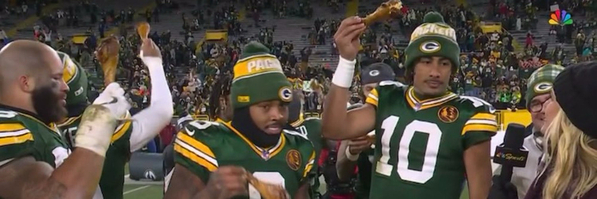I remember an article a few years back in Sports Illustrated that dealt with home field advantage and claimed that all the old explanations, things such as fan support, familiarity with the field, playing in certain weather, being at home and rested, etc. were not really relevant. The hypothesis of the article, which was meticulously documented was that HFA had to do with officiating. That officials, in all sports, subconsciously make calls that help the home team because they want to be liked as opposed to have 60000 people angry at them (although I suppose that would connect somehow to fan support).
I remember the article every time I see a particularly rotten call go against the Pack in away games. They don't seem to have as many in home games.
This worries me more than whether Justin Smith is going to play this week. I hope we lead by 40 at the half so as to take the officials out of the game.
Original Post
